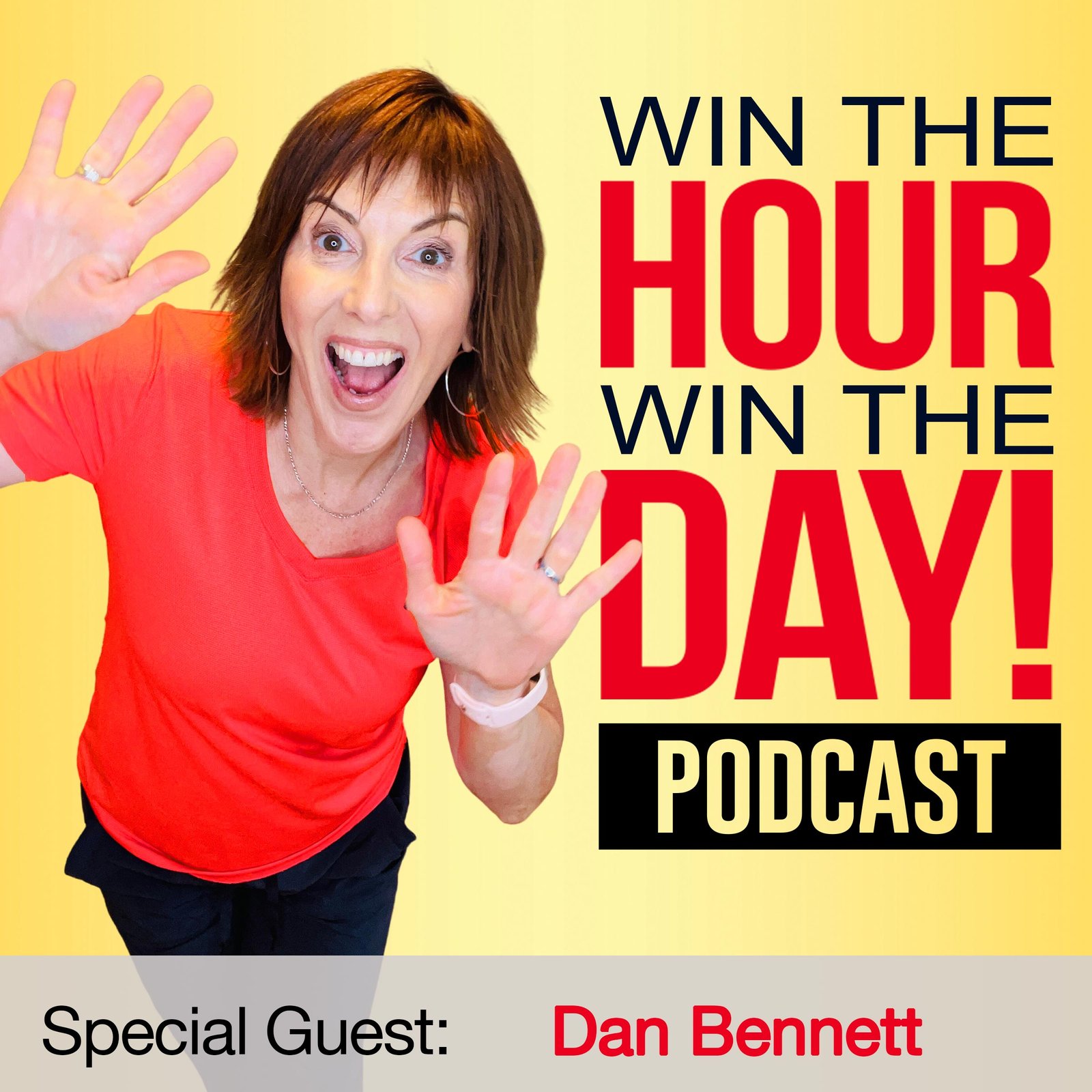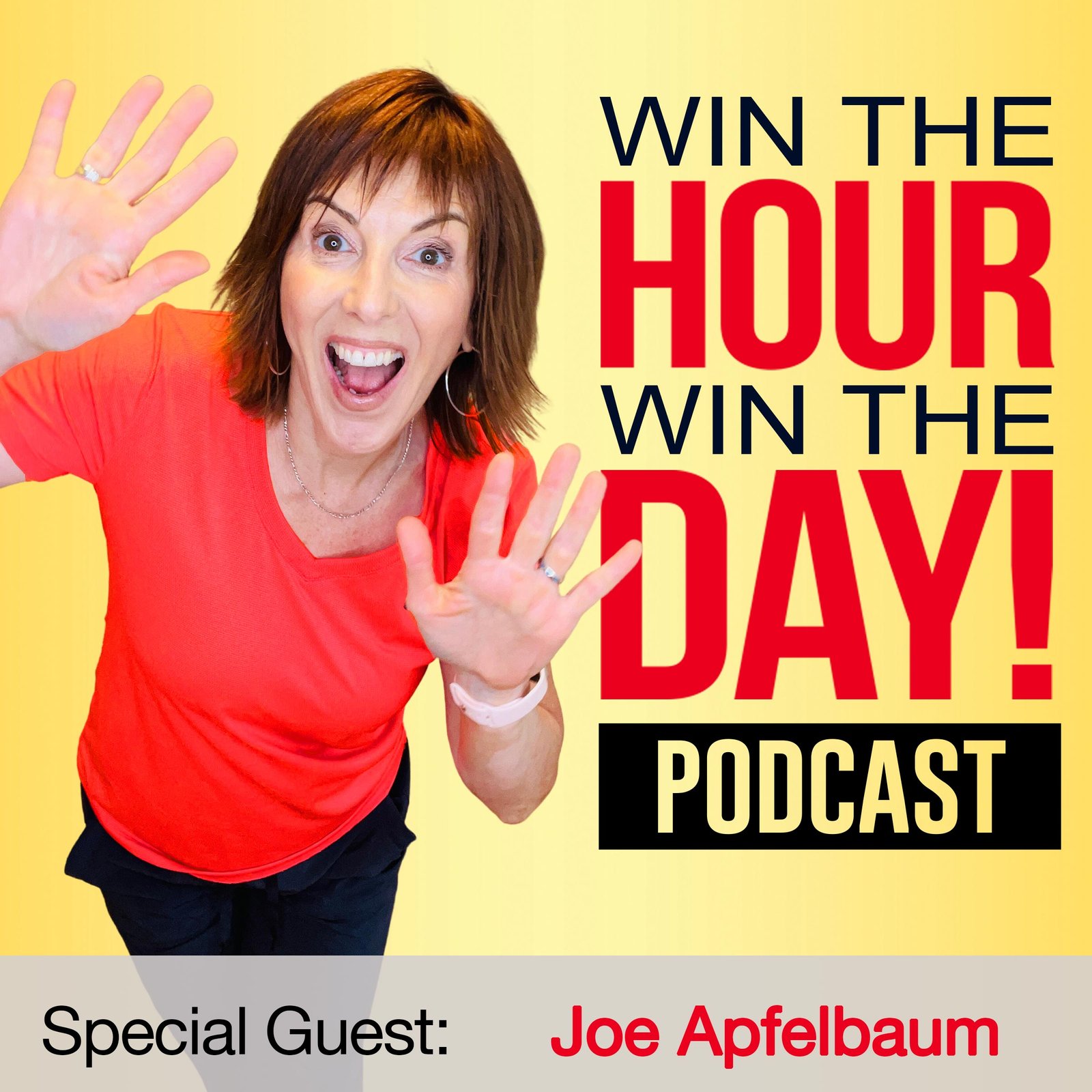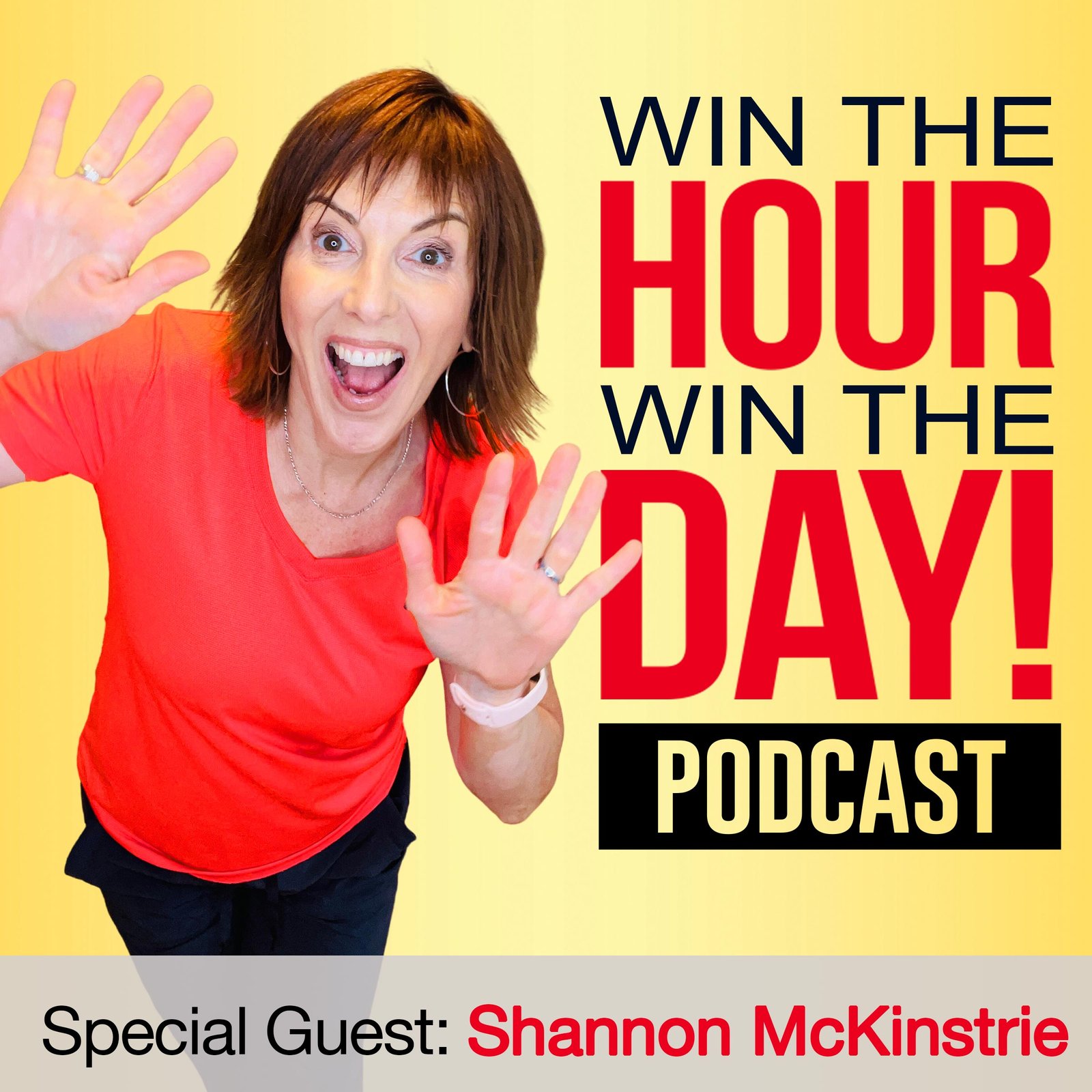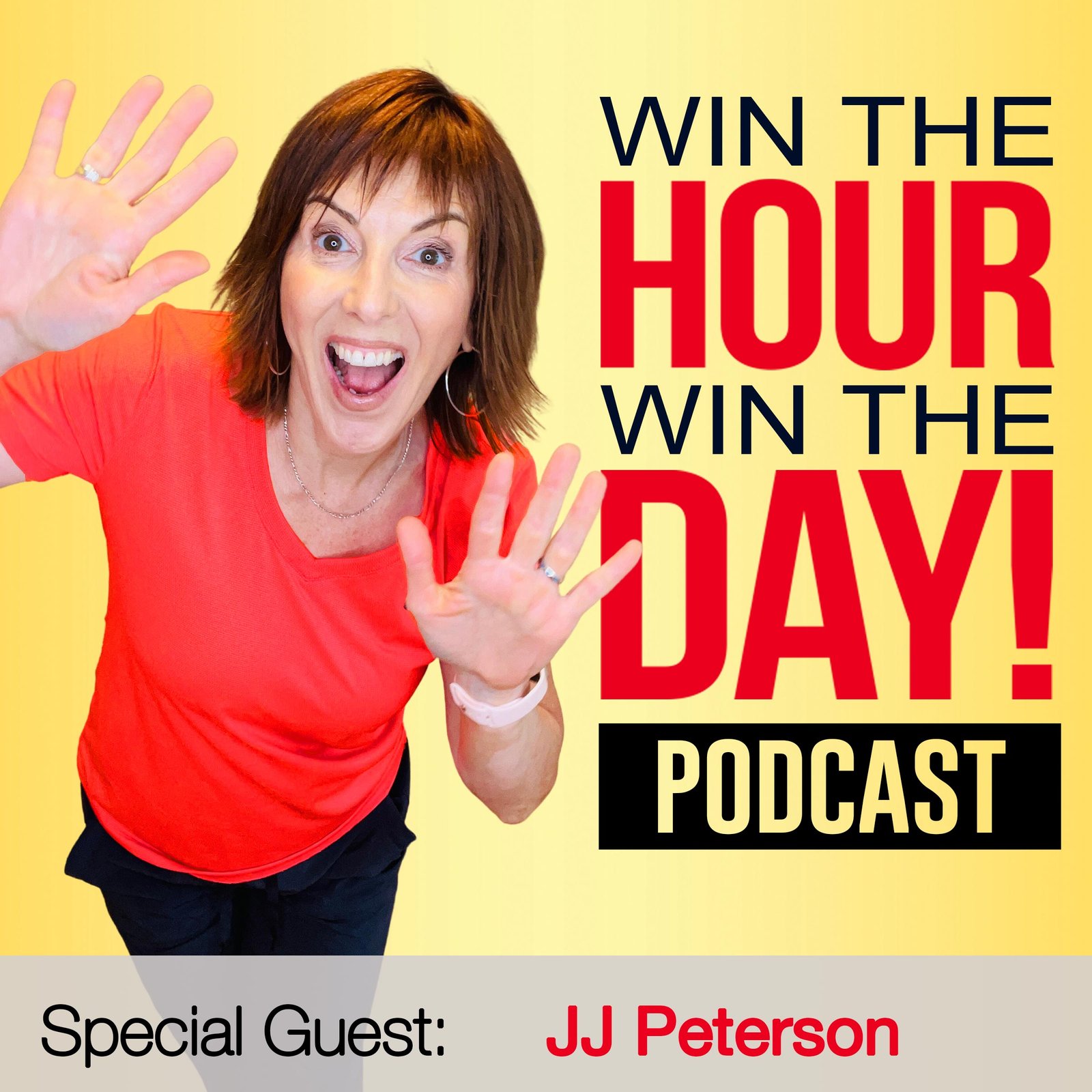Episode Summary This week’s episode of Win The Hour, Win The Day Podcast is...

Are You Ready For Your Next Big Win?
Know your entrepreneur personality and I’ll take it from there!
Recent Podcast Episodes
Preventing Burnout with Smart Work Tools! with Kris Ward
Episode Summary This week’s episode of Win The Hour, Win The Day Podcast is...
Master Social Selling: Heidi Medina’s Strategies for Engagement
Episode Summary This week’s episode of Win The Hour, Win The Day Podcast is...
Boost Productivity and Master Storytelling! with AmondaRose Igoe
Episode Summary This week’s episode of Win The Hour, Win The Day Podcast is...
Master Video Marketing: Top Tips for Entrepreneurs with Dan Bennett
Episode Summary This week’s episode of Win The Hour, Win The Day Podcast is...
Boost Your LinkedIn Strategy with AI Tools for Enhanced Productivity! with Joe Apfelbaum
Episode Summary This week’s episode of Win The Hour, Win The Day Podcast is...
Mastering Personal Branding with NLP Techniques! with Olesija Saue
Episode Summary This week’s episode of Win The Hour, Win The Day Podcast is...
Innovative Lead Generation and Email Automation Secrets with Jennie Wright
Episode Summary This week’s episode of Win The Hour, Win The Day Podcast is...
PR Strategies for Diverse Entrepreneurial Impact! with Jennifer Singh
Episode Summary This week’s episode of Win The Hour, Win The Day Podcast is...
Convert More Clients on LinkedIn with Richard Moore
Episode Summary This week’s episode of Win The Hour, Win The Day Podcast is...
Master Business Growth on Pinterest with Meagan Williamson
Episode Summary This week’s episode of Win The Hour, Win The Day Podcast is...
24/7 Sales Boost: Video Marketing Secrets with Alex Sheridan
Episode Summary This week’s episode of Win The Hour, Win The Day Podcast is...
Master Public Speaking Tips with Nausheen Chen!
Episode Summary This week’s episode of Win The Hour, Win The Day Podcast is...
Beating The Burnout With Connie Whitman’s Success Story
Episode Summary This week’s episode of Win The Hour, Win The Day Podcast interviews,...
Craft Your Social Media Content Strategy With Shannon McKinstrie
Episode Summary This week’s episode of Win The Hour, Win The Day Podcast is...
Boost Your Productivity with AI Tools: A Deep Dive with Erik Fisher
Episode Summary This week’s episode of Win The Hour, Win The Day Podcast is...
Boost Visibility: Repurpose Content and Leverage Podcasts With Christina Lenkowski
Episode Summary This week’s episode of Win The Hour, Win The Day Podcast is...
Master Personal Branding & Storytelling with Lisa McGuire
Episode Summary This week’s episode of Win The Hour, Win The Day Podcast is...
Boost Business on LinkedIn with Catherine B. Roy’s Strategies
Episode Summary This week’s episode of Win The Hour, Win The Day Podcast is...
Scale Your Business: Optimizing Virtual Assistant Services with Kris Ward & Rachel Eubanks
Episode Summary This week’s episode of Win The Hour, Win The Day Podcast is...
Affordable PR Mastery: Crystal Richard Unveils Modern Techniques
Episode Summary This week’s episode of Win The Hour, Win The Day Podcast is...
Mastering Business Storytelling with JJ Peterson’s Guide
Episode Summary This week’s episode of Win The Hour, Win The Day Podcast is...
Revamp Your About Page: Guide to Personal Branding
Episode Summary This week’s episode of Win The Hour, Win The Day Podcast is...
LinkedIn Mastery and Video Marketing Secrets with Alex Sheridan
Episode Summary This week’s episode of Win The Hour, Win The Day Podcast interviews,...
The Systems and Processes Playbook: Insider Secrets to Streamlining Your Small Business with Leah Abunales
Episode Summary This week’s episode of Win The Hour, Win The Day Podcast interviews,...
How To Avoid Pitfalls In Your Business! With Michelle Seiler Tucker
Episode Summary
Michelle Seiler Tucker is all about the business of business! A best selling author, international speaker, Michelle is now launching her newest book “Exit Rich.” She joins us and shares some powerful insights, and pure education on the world of business.
Learn
-the biggest mistakes most entrepreneurs make.
-the most important thing you need to do today.
-stunning research about the radical shift in business
Michelle Seiler Tucker is the Founder and CEO of Seiler Tucker Incorporated. As a 20-year veteran in mergers & acquisitions, Michelle has sold hundreds of businesses. She owns and operates several successful companies and holds the following professional designations and certifications: Merger & Acquisition Master Intermediary (M&AMI), Certified Senior Business Analyst (CSBA), Certified Mergers & Acquisitions Professional (CM&AP) Certified Business Broker (CBB), Panelist for M&A Source, Keynote Speaker. Michelle is also the Best-Selling Author of the book ”Sell Your Business for more than it’s Worth”, and her latest book “Exit Rich”is available now for purchase.
In addition to being featured in INC, Forbes, and USA Magazine, Michelle makes regular radio and TV appearances on Fox Business News and CNBC. She has spoken alongside many prominent speakers: Eric Trump, Kathy Ireland, Mayor Rudy Giuliani, Donna Karen, Stedman Graham, Randi Zuckerberg, Steve Wozniak, and more. Michelle also shares her wealth of experience with perspective M&A advisors by conducting multiple training, mentoring, and partnering programs. Over the years, these programs have helped many individuals become successful M&A advisors and business brokers. Michelle Seiler Tucker’s remarkable track record proves her dedication to her clients and has solidified her as a formidable force in her industry. She closes nearly 98% of all written offers and, on average, obtains 20-40% above asking price for her clients. Through this process, she empowers her clients to afford the lifestyles they have always dreamed of and, most importantly, deserve!
Join The Community: https://www.facebook.com/groups/WinTheHourWinTheDay/
Win The Hour, Win The Day! www.winthehourwintheday.com
Podcast: Win The Hour, Win The Day Podcast
Facebook: https://www.facebook.com/winthehourwintheday/
LinkedIn: https://www.linkedin.com/company/win-the-hour-win-the-day-podcast
You can find Michelle Seiler Tucker at:
Website: https://www.seilertucker.com
Personal Facebook: https://www.facebook.com/michele.seilertucker
Business Facebook: https://www.facebook.com/michelletuckerinternational
LinkedIn: https://www.linkedin.com/in/michelleseiler
Instagram: https://www.instagram.com/michelleseilertucker
Twitter: https://twitter.com/MSeilerTucker
Check out the Outsourcing Playbook For Busy Entrepreneurs here: https://winthehourwintheday.com/outsourcing-playbook
Michelle Seiler Tucker Transcription
Kris Ward: Hey, everyone. Welcome to another episode of Win the hour, win the day. I am your host, Chris ward. Today, we have Michelle Siler Tucker in the house and Oh my gosh, you got all kinds of things we can talk to her about. It’s going to be phenomenal. All right. I have, I mean, Michelle has got such a bio.
[00:06:33] We’re just going to say. Gloss over all the exciting parts. She’s a 20 year veteran of emerge at merges and acquisitions. Now you might think, Oh, but you know, I’m an entrepreneur was that got to do with me. Oh, she’s going to be still all kinds of brilliance that she learned from us, small, medium, large businesses.
[00:06:49] Um, you may have seen her on Forbes, us magazine. She just regular radio guests. And she’s worked with some pretty impressive, uh, captains of industry and celebrities, everything from Kathy Ireland. Stedman Graham to, you know, Randy Zuckerberg, you know, Steve, Wazniak all, they all the gang’s all here. So welcome to the show.
[00:07:10] Michelle Seiler-Tucker: Thank you, Chris. Thanks for having me. It’s a pleasure to be here.
[00:07:13] Kris Ward: We’re excited. Okay, so let’s talk about, alright, let’s talk. Let’s just dive right in and talk about really what are some of the biggest mistakes that entrepreneurs and small business owners make today?
[00:07:26] Michelle Seiler-Tucker: So, you know, there’s a tremendous amount of mistakes and they’re making more mistakes now more than ever before.
[00:07:32] It used to be, you know, when I wrote my first book in 2013, um, I did the research and learned that 80 to 90% of businesses, 85 to 95% of businesses will go out of business startups one to five years. Right. Well then when I wrote exit rich and did the same research. I learned that the business landscape has changed dramatically.
[00:07:52] It’s actually flip-flopped. So now only 30% of startups will go out of business. However, here’s what you need to pay attention to out of 27.6 million companies. Those businesses have been in business 10 years or longer. 70% of those businesses will go out of business. So only 30% of startups and 70% of businesses have been in business 10 years or longer.
[00:08:16] Kris Ward: Oh, my gosh. Okay. So that’s really something we want to highlight. So you’ve been in business 10 years or longer, and now you have a higher failure rate. We used to think once you pass the five-year Mark. Okay. You can take a breath. But now what you’re saying is those that have been business 10 years or longer, they have a higher failure rate.
[00:08:33] Michelle Seiler-Tucker: They do. It’s actually flip-flopped
[00:08:35] Kris Ward: and
[00:08:36] Michelle Seiler-Tucker: heard about this. See, most, most business people don’t know about this because when you hear about it in the media, you’re only hearing about the public companies like toys, R us and Steinmart Kmart pier won all of the big public stores. But Chris, what you’re now hearing about all the small private businesses on every street corner, in every town, in every state, across our great nation, these businesses.
[00:08:58] Or dropping like flies and nobody in the media is covering us whatsoever. And this is before COVID by the way.
[00:09:04] Kris Ward: Right. Okay. So what do you think that is? I have my guests. You tell me what? Well, let me, well, maybe I should just throw in my guests if I can. Okay. You can point out how wrong I am. Um, I’m pretty passionate
[00:09:18] Michelle Seiler-Tucker: about even if you’re wrong.
[00:09:20] Kris Ward: No, no, no. You can. I’m pretty passionate that unless you have a team and systems in play, you’re, you are a self employed, uh, versus being entrepreneur so that you think you have a business and you really don’t and all you need is one little hiccup and you’re derailed. Right? So I think it’s a lack of systems or the ability to sell it because really you’re self-employed.
[00:09:43] Michelle Seiler-Tucker: Yeah, so you’re half, right.
[00:09:45] Kris Ward: Okay. I can half a point.
[00:09:49] Michelle Seiler-Tucker: The reasons that that eight out of 10 businesses don’t sell, but the reason that 70% of businesses are failing, they’ve been in business 10 years or longer, or more than just systems and people. The big reason is because business owners have become complacent and they stopped doing what I call aim, aim, aim, aim, always innovate and market businesses had been in business 10 years or longer stopped innovating, and I stopped marketing.
[00:10:19] And guess what? Consumers buying habits have changed dramatically. You think Amazon for that? The way that we use to purchase products and services are not, this is not the same way that we purchase products and services now because Amazon makes it so easy. The purchase, whatever we need and have it shipped to our doorstep within two days, you can also
[00:10:41] Kris Ward: interrupt you.
[00:10:41] There’s somebody at my door with parcel. No, I kid you.
[00:10:47] Okay. I know. Let me, so let me ask you this. Can I throw this in here? What would you think the modern day entrepreneur is? So maybe I, now let’s say I. I don’t want to, I don’t think age has anything to do with it. So I don’t want to date somebody, but let’s say I’m an older, more mature lawyer, which by the way, I know my mother is very tech savvy and so it doesn’t have it.
[00:11:08] I don’t want to limit somebody by age. But let’s say maybe back in the day, or you’ve got somebody that you’re, whatever you have a service and a is not a great example, but you have a service. And now you’ve been continuing to provide that service for 10 years where I find the modern entrepreneur is like, okay, now I’ve been doing that service for a couple of years now.
[00:11:25] I wanted to coach one many instead of one-to-one and now I want to get my info product and my book out. So whether I’m using aim or not, Always innovating and marketing by virtue of my ambition and technology. I am always innovating and marketing because I’m trying to climb the next mountain. Whereas before if the store was open, you know, if you were at a hardware store and it was open, that was a success, there was no new frontier
[00:11:49] Michelle Seiler-Tucker: decline.
[00:11:50] Right. So that makes
[00:11:51] Kris Ward: sense.
[00:11:52] Michelle Seiler-Tucker: Yeah, absolutely. Okay. Innovating in marketing because yeah. If you have one client now, you’re like, why can coach mini and I can do this, you know, that is still innovation, right. That’s innovation different. And you’re either growing or you’re dying. Right,
[00:12:05] Kris Ward: right. And all I’m saying is maybe it was, some of us are doing that by default without really a strategy.
[00:12:11] But we just have ambitions. The modern day. Entrepreneur allows us to see what other people are doing. We have more and more ambitions, whereas before it’s like, if I had a store and I wasn’t looking at what Amazon is cutting into my pie, now I’m not innovating. Right. Right. Okay. Makes sense. My
[00:12:26] Michelle Seiler-Tucker: apologies. A lot of these companies, you know, like the big, the Publix businesses, like toys R us, I mean, they did the same thing for 70 years.
[00:12:33] They never changed anything. You know, for 70 years, even blockbuster blockbuster sold in that they saw the writing on the wall. They had an opportunity to purchase Netflix. They sat there fat and happy and did nothing. So this is why businesses. This is one of the big reasons that companies are going out of business because they’re also are disconnected from their clients.
[00:12:53] They stop asking their consumers or clients, what do you need? What do you want? How can I make it easier for you to do business with that? You know, clients are going to go, well, you treat them right. Where, where it’s easier to do business with them, or it’s more convenient. And this owners stop asking clients that question.
[00:13:10] And like I said, our buying habits have changed
[00:13:13] Kris Ward: so we could talk all day. Cause I know for me, the, the turning point in life was when Kodak ever a hundred years went out of business and you would think, you know, they were the brand right. And you would think when you at a hundred years in, you could take a breath, right?
[00:13:25] Like, Oh, you know what we think? Okay. We can rest. Now we hit the a hundred year Mark. Okay. So you’re talking though, but the rest of us, maybe we’re going, ah, yes, Michelle, but that’s the big companies I’m different. So, can you relate this message to the small entrepreneur or the small business? Because, and I don’t sorry, people, I don’t like that word either small because we’re not small, we’re living big.
[00:13:48] All right. But the perceived small business or the entrepreneur, how is it that we’re not innovating? Cause really. Amazon, you know, that’s a whole beast, but does it affect what I’m doing? Tell me how it affects the regular entrepreneur.
[00:14:01] Michelle Seiler-Tucker: Yeah. So obviously infects the rug while entrepreneur, because the statistics are real.
[00:14:05] Like I said, 70% of these businesses are going out of business. I didn’t make those statistics up, but the way it’s affected it, you know, I’m trying to think of a story I can give you really quickly. All right. Manufacturing business. Well, it’s not really a manufacturing business. It’s more of that welding business on, they do fabrication.
[00:14:20] They’ve been in business for about 30 years. And it’s two partners. I think they have like three employees and they’ve never done anything differently. It, they have never purchased new equipment. You know, there’s new equipment in that industry that can make them run a lot more efficient and productive and put more money in their pocket and operate with less people.
[00:14:42] I mean, they have three people right now. The problem is it’s very hard to sell this company because you take the two owners out. There is no business, plus they have, they have antiquated equipment. So anybody who purchased that business will right away have to replace the two partners right away, have to place new equipment right away, um, implement some new innovation and marketing strategies.
[00:15:04] Well, that’s like example right there.
[00:15:06] Kris Ward: Yeah. And I tell people all the time, you know, if you don’t have systems in a team, there’s nothing for them to buy. They would buy an employee, which is you getting a job? I always say it’s like watching sports and sitting on the couch, calling yourself an athlete.
[00:15:18] You’re not, you’re just watching the game.
[00:15:20] Michelle Seiler-Tucker: So let’s dive into. You’re just talking about my two P’s right there. People,
[00:15:26] Kris Ward: I was just going to say, let’s dive into the six piece. So we’ve got two. So tell me about them.
[00:15:31] Michelle Seiler-Tucker: Yeah. So let me tell you about people real quick. So, you know, you don’t build a business, you build people, people build a business and that’s, the problem is a lot of business owners or the business, you know?
[00:15:41] Um, they, they, they have this mentality that if I want it done, right, I have to do it myself. I have to do everything. I’m a control freak. And. That’s the wrong mentality. Focus on your strengths, hire your weaknesses. And business owners really needs to have the right people in the right seat, because if you don’t have the right people in the right seat, you don’t have a business, you have a job.
[00:16:00] And then you need to ask the who question, who and your business opens up, who handles customer service issues, who handles manufacturing, who handles logistics, distribution, marketing, customer acquisition costs. I mean, the list goes on and on the clue here, Chris. Is, you should never be next to the who.
[00:16:17] Right? So your name should never not be an excellent hula. It should be substainable. You need to build a business that can run without you, because if you don’t, it’s really not sellable. I mean, think of it like a dental practice, right? So we have a dental practice right now. Dentist one, dentist. Yeah. Well, there is no practice.
[00:16:36] We have a chiropractic clinic right now. We’re trying to sell and he’s like, Michelle, we’re great. We have two doctors. Well, you know what? Your two doctors are leaving.
[00:16:42] Kris Ward: You. Yeah,
[00:16:44] Michelle Seiler-Tucker: you have no business.
[00:16:46] Kris Ward: No. And, and I give an example in my book when the are, when the day and what it was is I was going to a marketing client of mine at the time.
[00:16:51] And she had a fancy restaurant. One of these things where you spend 25, 30 bucks on a salad, but you leave just as hungry, if not more. And it was really a fancy South. And we went in and it was like a spring day and it was in Canada. So what happens is one day is really warm. Then one day is cool. So you went in the day before, had been really warm.
[00:17:08] Now here’s the thing. Her server who makes like minimum wage an hour, but did lunch special every day was off sick. So you walk in and instantly you’re freezing cold. And what it was is she always opened the restaurant, even though she had no manager position, no process to follow or anything. And she was the only one that knew how to shut off the air conditioning.
[00:17:28] The owner is there. She doesn’t know how to shut it off. People are getting upset. They’re leaving, you know, they’re copying all these meals. It’s a horrible experience. It’s all because she didn’t know how to shut off the air conditioner. Like that’s a process, like we’re not talking logistics and, you know, fabrication and warehouses people we’re talking really basic stuff.
[00:17:47] Right? Yep.
[00:17:48] Michelle Seiler-Tucker: Yep. Very basic stuff. Very, you know, and it happens to even the best of us sometime, you know, I was in my conference room and a board in, in a board meeting with one of the companies I own. And my it guy was here. Well, my door was locked. Nobody asked me for the keys. They had the it guys sitting here waiting for two hours.
[00:18:08] I pay him per hour. I’ve done the door. I had the keys the whole time and nobody even know.
[00:18:13] Kris Ward: Oh, no, no. Okay. So tell us the other piece.
[00:18:16] Michelle Seiler-Tucker: So, okay, so that was people. So product is the second P product is, you know, you have to ask yourself as your industry on the way up or on the way out. Okay. Have an Amazon, or do you have a blockbuster?
[00:18:27] If you have a blockbuster, you better pivot you better pivot. And here’s the deal. Ask yourself three transformational questions. Get out of the transactional, become trans transformational. Ask yourself what business are you in? Okay. Sometimes you need an outsider’s perspective to help you ask these questions and answer these questions.
[00:18:46] But number one, what, what type of business are you in? What do you do really? Well? What business should you be in? Okay, let me illustrate this with a story Amazon. Right? What businesses? Amazon. In what business did they start?
[00:18:59] Kris Ward: Oh, they started in
[00:18:59] Michelle Seiler-Tucker: books. Yeah. Well, it’s been gone. I asked her what business am I an amen.
[00:19:03] The books business. What do we do really well? Let’s say we do fulfillment really well business. Should we be in? We should be in fulfillment, not just
[00:19:11] Kris Ward: ones
[00:19:13] Michelle Seiler-Tucker: questions. Transform them into a multi billion dollar conglomerate versus just a little small book company. So,
[00:19:19] Kris Ward: yeah. You know, that’s interesting because I know for me as a marketing strategist, which I did for years and still do I have marketing clients, it’s just not something you see me online promote because what evolved out of my marketing experience was when the hour, when the day and strategies and team building and stuff.
[00:19:33] So we have marketing clients that often find out I’m still marketing stash, strategists through our, when the hour, when the day platform, but people kept coming to me for those strategies. You know, my marketing clients say, Oh my gosh, how do you do this? And how do you keep it running the business running when you’re away and all this stuff.
[00:19:48] So, so I’m like, all right, eventually enough people asked like, okay, I’ll help you a little bit, little bit. All right. A book. Okay, here we go. So the first few people I did say, Oh, no, I’ll give you a few tips, but that’s not what I do. And then eventually I thought, well, what I do is what they pay me for. And if it’s helping other businesses, I’ll keep them in business.
[00:20:05] Then they can use my marketing strategies. Right. So fabulous point fabulous point. Okay. Continue with the peas.
[00:20:11] Michelle Seiler-Tucker: So we got paid product comments. Number three is what you already said. It’s processes and processes are extremely important, but it’s kind of like planning your exit. Most business owners don’t think about their exit or think about processes until they have to less until, you know, somebody gets injured in, in the warehouse because there wasn’t a health and safety process in place, or because I have a bad customer review on Google.
[00:20:35] Because their processes were not designed with the customer experience in mind. Have you ever watched a movie? The founder?
[00:20:44] Kris Ward: Yes. The speed of system.
[00:20:45] Michelle Seiler-Tucker: Yes. You remember the McDonald’s? Yes, forties. Wanting to start a fast food restaurant because back in the day five up and it came out in rollerskates and they bought your food, but it was Dora was wrong.
[00:20:57] The food was code and it took forever. Right. Other said, here’s our mission statement. Here’s what we want our customer experience to be. We want to deliver great tasting food under two minutes or less fast. Right? How are we going to do that? They go to the empty tennis court, they draw it all out. They take their employees, they did this all day long until they figure out.
[00:21:18] Who’s going to take the customer’s order. Who’s going to toast the bones. Who’s going to put the pickles on the bottom. Who’s going to give it to the client in two minutes or less. That process right there is why you can go to McDonald’s in Hong Kong or Russia or Singapore America, and get the same experience because they designed it with the customer experience in mind.
[00:21:39] Kris Ward: And also I’d like to add to that. Yeah, which was really important too, is when they went to the empty tennis court and use core, we use chalk. That’s the thing I keep talking about. When I talk about team building, it doesn’t have to be sophisticated. They didn’t buy a bunch of machinery and then move things around.
[00:21:54] You can create the most elaborate efficient customer pleasing systems with little to no money. And that’s a really powerful message you just highlighted because they just did that for hours with the child. Right. Right, right.
[00:22:06] Michelle Seiler-Tucker: Okay. Have you ever seen Chris, have you ever seen tiny houses? Yes. Yeah. You never seen him.
[00:22:13] Like, you know, the people who built tiny houses on the show, they get the family together. It’s like a family of six. It’s going to go from 4,000 square feet into like 300 square feet. Like practice the processes of how they’re going to move and how they’re going to cook and how they’re going to do this and that.
[00:22:27] And have you seen that? I
[00:22:29] Kris Ward: have why it though? Once they bring in two pairs of shoes, they’re out, but
[00:22:32] Michelle Seiler-Tucker: Oh yeah. She wears the shoes at one person I’m out. Okay.
[00:22:36] Kris Ward: So, um, yeah, really. So we’re looking at people process product, which now we’re right now here with Marcus, uh, from the prophet. So tell me how you deviate deviate from market for that.
[00:22:46] Oh my gosh. From Marcus, from the profit, what are your other three piece?
[00:22:49] Michelle Seiler-Tucker: Proprietary cyber dune it’s way before Marcus. Cause I’ve been doing this for 20 years. Anyway, proprietary. Their proprietary is a number one value driver, but probably would get you the highest multiple in your business. There are six pillars to proprietary, so I’ll go through them rather quickly.
[00:23:04] Number one is branding the bigger the brand, Chris, as long as it’s still relevant and you’re in a consumer’s mind in a higher price, you’ll get for your business. The biggest brand in the world is.
[00:23:16] Kris Ward: Amazon or Apple vac. Yeah,
[00:23:21] Michelle Seiler-Tucker: Apple $389 billion just for the Brian. That’s not cashflow real estate or anything else.
[00:23:28] The other big thing and proprietary is trademarks. One of the biggest mistakes business owners make is they go out when they start their business, they get a state trademark. But they never checked to make sure there’s a federal trademark available. So they’ll be in business for four or five, six, seven years, and all of a sudden receive a cease and desist letter.
[00:23:48] This letter in the mail and, and a half to, they, they’ve spent a lot of money at it to try to get it to stop and they lose because somebody else has a federal trademark. So they have to close that name down and start all over again. So go out and spend $1,500 and get a federal trademark.
[00:24:06] Kris Ward: Okay. Fabulous.
[00:24:07] Michelle Seiler-Tucker: Patents are big. Patents are really, really big. What if you ever watched shark tank was the first thing that they all asked. Do you have a patent? Do you have a patent account? And we sort of business for $80 million. I had 18 patents, a million dollars a patent. So go out there and protect your IP and get a patent contracts also are huge.
[00:24:25] Yeah. Manufacturers, distribution, franchise, or contracts. Um, client contracts are the biggest. So buyers want to buy a business. That’s making money. They want reoccurring income, residual income coming in. So contracts are big. However, here’s another mistake, Chris is that most business owners never have the transferability clause in our contract.
[00:24:46] Kris Ward: Oh. To a new owner. Ah, okay. Okay.
[00:24:49] Michelle Seiler-Tucker: 9% of all sales are asset sales, not stock sales.
[00:24:53] Kris Ward: Okay.
[00:24:53] Michelle Seiler-Tucker: Gotcha. That’s an asset. So you don’t have that transferability clause or your deal could fall apart. And then the other big thing and proprietary is databases. Databases are huge. Facebook paid $19 billion for WhatsApp and WhatsApp was hemorrhaging money, but they had a billion users, not a basic, I mean, we targeted and repurposed.
[00:25:14] We can get you a lot of money for that database. And then, um, I call it
[00:25:18] Kris Ward: the almighty lists that we talk about all the time people, the almighty list. Okay. Gotcha.
[00:25:23] Michelle Seiler-Tucker: Gotcha. And then there’s also intellectual real estate. So when I say intellectual real estate, I’m not talking about your commercial building or your land.
[00:25:30] I’m talking about, about your real estate. So let’s say you have a skincare company and you’re on Oprah’s favorite things and Oprah is endorsing your skincare company. You think people would pay for that? You think buyers, synergistic buyers will pay for that? Absolutely. Or let’s say that you have a diet company in rush Limbaugh, Glenn Beck, or somebody is endorsing that they can only endorse.
[00:25:50] One diet company at a time, or let’s say you’re manufacturing, sheets and pillowcases and linens. And you’re number one on Wayfair.
[00:25:58] Kris Ward: Right? Right. This
[00:25:59] Michelle Seiler-Tucker: is all what I call it. Sure. Real estate, the standard buyers will pay a lot of money for, and then they, fifth P is patrons. You have to ask yourself, do you have customer diversification or customer concentration?
[00:26:10] Do you follow the golden rule where 80% of your business comes from 20%? Every clients. And if you lose a couple of clients, what happens? So you really need to ask your clients, and this is why else this is why businesses stop, go. I may started going out of business because they stopped asking their clients, what do you need?
[00:26:25] What do you want? And you provide a great experience for them or they’ll go somewhere else. So also business has been in business 30, 40, 50 years, or clients are aging out. So I actually replaced those clients and millennials do not buy the same way that gen X buys or the same way that baby boomers buy.
[00:26:42] So again, innovation and marketing.
[00:26:44] Kris Ward: Yeah. I know, I know even a sports arenas, although we’ve had some issues with that tendons lately, but sports and media is targeting the younger audience or even Harley Davidson, which, you know, thrived for so long and they’re struggling with the. Younger consumer not buying the big hogs, like their market, their demographic is, is aging out.
[00:27:02] Right. So yeah, really good point. Okay. All right. Okay. And our
[00:27:06] Michelle Seiler-Tucker: last P is profits. Okay. Money, but here’s the, here’s the thing. This is why I put profits last. Okay. Province is never the problem. Never, it’s always a symptom of not op I know one of the other five PS, if you don’t have the right people in place, you’re going to have a profit issue, right?
[00:27:24] Product is dying and not thriving. You’re going to have a profit issue. If your processes are not productive efficient, and your client, your employees will train on it. You’re going to have a profit issue. If your IP proprietary is not protected. You’re going to lose market share same thing with patrons.
[00:27:39] So pop is always a problem. Not operating on one of the other VPs. It’s a symptom, not the problem.
[00:27:46] Kris Ward: Good point. All right, man. We have been schooled. Okay. We have
[00:27:50] Michelle Seiler-Tucker: a few school. Y’all
[00:27:52] Kris Ward: no, no. I thought it was good schooling. I thought it was good schooling. Not a, not a, not a negative thing at all. Very positive.
[00:27:58] Okay. So we’ve got a few minutes left. Tell us one last big thing that you think you’ve gotten some more wisdom on us. What’s something else you feel we should know before we wrap
[00:28:07] Michelle Seiler-Tucker: up. Well, number one, I want to tell them how they can get exit
[00:28:10] Kris Ward: rates.
[00:28:11] Michelle Seiler-Tucker: Okay. It’s time for that.
[00:28:12] Kris Ward: Sure. Go ahead.
[00:28:14] Michelle Seiler-Tucker: Okay. So, um, ex rich, you know, we had to pivot there’s your seven P yeah.
[00:28:20] Richard’s coming out in 2020, but extra Richard coming out and, and, um, January of 2021. And, um, if you go to extra rich book.com, we’re in the middle of presales and it’s only 24 79, which includes shipping, which is less expensive than Amazon. You will receive the digital download immediately when you order.
[00:28:39] Okay. And you all will ship the hardcover to your doorstep. Plus you’ll get a lifetime membership into exit rich book club, which has me doing video training and doing deep dives. But as importantly, we have documents, Chris, if you’ve never seen an employee handbook, our non-compete. Or a sample Ella LOI letter of intent, a sample purchase agreement, sample due diligence checklist, sample, closing docs.
[00:29:05] It’s all there for you review
[00:29:07] Kris Ward: and
[00:29:08] Michelle Seiler-Tucker: promote. And then they will receive 30 days in the club CEOs, which is a like-minded entrepreneurial club that I started, but we do hot seats, Q and A’s and ASOS transformational questions. So we can have business owners not just survive, but thrive on the other side of this.
[00:29:23] Kris Ward: Okay. Now these letters of intent and the awesome documents are giving. Are they going to help? Uh, can we make them generic for our worldwide listeners? We’ve got a lot of people in Australia, Italy, Canada.
[00:29:35] Michelle Seiler-Tucker: Yeah know, they’re not really genetic though at all. And, um, they’re all in English. No.
[00:29:40] Kris Ward: I mean, no, I mean, as far as laws go like, or are they specific?
[00:29:45] Michelle Seiler-Tucker: They’re really based on the United States law.
[00:29:46] Kris Ward: Okay. Gotcha. Okay. Perfect. All right. In
[00:29:50] Michelle Seiler-Tucker: Canada, Canada’s does things very similar to United
[00:29:52] Kris Ward: States, so, yeah. Okay, perfect. Okay. So we know we just want to be clear for those Australians. We’ll get cute. We’ll take care of me later. I don’t know why we’ve got a big market in Australia.
[00:30:01] Michelle Seiler-Tucker: I have a bunch of Australians. I’ll do what I can do to try to make an apical for
[00:30:04] Kris Ward: them. Perfect. Okay. Awesome. Okay. So excellent. Rich. That’s where we can find you for the next little while.
[00:30:12] Michelle Seiler-Tucker: Exit rich book.com. And if they want, if your listeners want to follow me on social media or look at my other website, they can text Michelle eight eight, eight five two six.
[00:30:25] Five seven, five. Oh, gotcha.
[00:30:28] Kris Ward: All right. We’ll put that in the show notes guys. Michelle, thank you very much. It’s been a blast and you really just deliver it at a steady and strong pace. We appreciate you and everyone else till the next show. Thank you very much.
[00:30:40] Michelle Seiler-Tucker: Thank you, Chris. It’s been a pleasure.





























